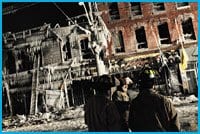On Feb 20 a six-alarm fire blazed through a block of Queen St W destroying several historical landmarks including Duke’s bicycle shop, a noted supporter of the Toronto People with AIDS Foundations Friends for Life Bike Rally.
The gutted strip, on the south side of Queen between Bathurst and Portland streets, is in the heart of a neighbourhood that is full of queer history and significance.
“It was cheap enough for marginal types like us, in particular artists and musicians looking for places to create, rehearse, display their works and live,” recalls archivist and activist Rick Bebout who wrote for The Body Politic during the 1970s when its offices were just south of Queen at 24 Duncan St, just blocks from where the fire broke out.
“It’s not a gay neighbourhood, it’s a neighbourhood where it’s okay to be gay,” says Bebout. “It was a street that basically said there’s no normal — except to be really cool.”
Bebout remembers how the Queen West neighbourhood came into its own in the mid-’70s, beginning with the opening of Toronto’s first punk rock club The Crash and Burn at 15 Duncan St in 1976.
“In just a few years Queen St W went from nothing special to the city’s most notorious club hotbed, its very name evoking a certain distinct style: cool, irreverent and sexually ambiguous,” writes Bebout in the 1978 chapter of his memoir Promiscuous Affections.
Bebout says the neighbourhood had an impact on the work of The Body Politic, the seminal gay magazine (and Xtra’s predecessor) which was recently named one of the 20 most influential Canadian publications by Masthead magazine.
“Culture happens in poor neighbourhoods where artists can afford to pay rent,” says Bebout. “The Body Politic attended to the local art and music scene in ways unlikely had it lived anywhere else. That accidental move in 1976 would long shape the paper’s sense of culture and even sexual politics.
“It was the nature of the street, it affected our politics. We didn’t get stuck into looking at gay as an identity. Part of what Queen St taught us is that you don’t do it by yourself, you do it with the other people who are there. Because we need to cultivate our differences, cultivate how we’re not normal and this was a whole community of people who did that, who wanted to do that. The alliances came mostly from the fact that these people understood that culture was political.”
Like most Torontonians Friends for Life cochair Todd Ross has his own Queen West memories. In the mid-’90s he lived above what was then the Hog motorcycle shop.
“It was kind of a granola experience living in that part of town,” says Ross. “I was working as a waiter on Church St and taking the streetcar home to Queen St W at night. There were a lot of eclectic people.”
Ross has cycled from Toronto to Montreal six times with the Friends for Life Bike Rally, an annual trip that raises money for the Toronto People with AIDS Foundation. The ride, which is celebrating its 10th anniversary, was recently voted honoured group for this year’s Toronto Pride parade.
Ross says that Duke’s, the family-owned bike shop that has operated at 625 Queen St W since 1914 and was gutted by the recent fire, has been “very much a part of the Bike Rally community.”
“Duke’s has helped us out in the past by doing training seminars and we’ve had riders who are employees of Duke’s and they’ve helped us with discounts on products we need,” says Ross.
“It’s very sad to hear about the burning and I am hoping that there’s something that the Bike Rally can do to help them get back on their feet…. It’s a tragedy that it’s gone, but any time there’s a tragedy I see it as an opportunity to come together.”

 Why you can trust Xtra
Why you can trust Xtra


